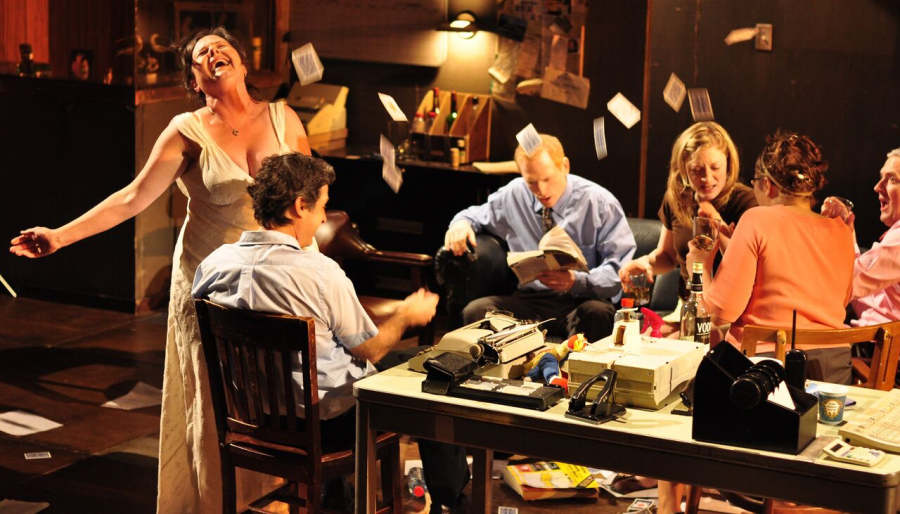Everyone knows the story of “The Great Gatsby,” one of romantic obsession, obscene wealth, free-flowing booze despite Prohibition — and that iconic green light. But you’ve never seen Gatsby done like this before.
Elevator Repair Service is staging “Gatz,” its marathon adaptation of the classic portrait of Jazz Age New York, at Skirball through Feb. 3. First performed in 2010, the show is essentially a staged reading of the entirety of F. Scott Fitzgerald’s 1925 novel and clocks in at just about eight hours, including two intermissions and a dinner break.
But “Gatz” is no slog. In fact, I would call it the most successful adaptation of “The Great Gatsby” I’ve seen, far surpassing Baz Luhrmann’s inert 2013 film starring Leo DiCaprio, or the 1974 effort with Robert Redford and Mia Farrow.
Neither a traditionally staged play nor a simple audiobook-style recitation of the text, “Gatz” is a genre all its own. The show opens on a dingy, nondescript, vaguely ’90s office space as a man unsuccessfully attempts to boot up a cartoonishly large desktop monitor. The man, bored and frustrated, discovers a copy of “The Great Gatsby” tucked inside his Rolodex; flipping it open, he begins to read aloud to himself.
As the man reads, his coworkers shuffle into the office for the day, murmuring inaudibly to one another. But soon, the actions of these unnamed workers begin to parallel those of characters in the text. A slouch-backed colleague of the reader mirrors Jordan Baker and her louche attitude, and a flighty blonde represents Daisy Buchanan and her weak wit, until one-by-one they take up their own lines of dialogue from the reader — who is now Nick Carraway, the narrator of Gatsby’s story, and the plot swings fully to life.
As someone who read “The Great Gatsby” in high school and didn’t really get the hype, “Gatz” brought the text to life for me in a way I hadn’t experienced before. A relatively short novel, “The Great Gatsby” is an ideal choice for this sort of adaptation; the narration is jam-packed with beautiful language that would be largely excised for a traditional staging, and the density of action and thematic allusion means the show is never boring.
The standout scene is the party at Tom and Myrtle’s love nest in the city during Act I, as it builds to an abrupt and dramatic climax. Still, the quieter moments of the show are no less compelling, especially the concluding stretch.
While the set remains constant throughout the entire performance, the light design and particularly the sound design deftly convey both setting and tone; the dull roar of ambient city noise mingled with car horns that forms the soundscape of the show’s beginning subtly gives way to the chirping of crickets as the characters sit talking on a veranda during a summer evening, and the dim, warm light looks like gas lamps lit against the dark.
A strong ensemble doesn’t hurt, but Scott Shepherd’s performance as Nick — with by far the most speaking time I’ve seen in a theatrical performance — is what really makes the show. The dry line readings he delivers milk the text of a surprising undercurrent of humor; his Nick is a vital, complicated figure, the lens through which we see Gatsby.
The story-within-a-story format of “Gatz” illuminates the fantasy theme in the original text that is sometimes neglected in favor of the widespread reading that focuses on the theme of the “American Dream.” The show’s title is the surname Gatsby was born with before rechristening himself. Gatsby’s fantasy love story with Daisy, Nick’s starry-eyed fixation on Gatsby and Gatsby’s self-mythologization all come to the fore. The audience feels like we’re inside this nameless reader’s imagination as he conjures up romantic images of a bygone era — by turns raucous and contemplative, contained and uninhibited, but always entertaining and emotionally stirring.
“Gatz” is now running at the Skirball Center for the Performing Arts through Feb. 3.
A version of this article appears in the Monday, January 28, 2019 print edition.
Email Alex Cullina at [email protected].
























































































































































